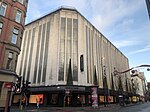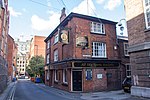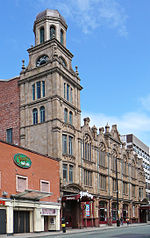John Rylands Research Institute and Library

The John Rylands Research Institute and Library is a late-Victorian neo-Gothic building on Deansgate in Manchester, England. It is part of the University of Manchester. The library, which opened to the public in 1900, was founded by Enriqueta Augustina Rylands in memory of her husband, John Rylands. It became part of the university in 1972, and now houses the majority of the Special Collections of The University of Manchester Library, the third largest academic library in the United Kingdom. Special collections built up by both libraries were progressively concentrated in the Deansgate building. The special collections, believed to be among the largest in the United Kingdom, include medieval illuminated manuscripts and examples of early European printing, including a Gutenberg Bible, the second largest collection of printing by William Caxton, and the most extensive collection of the editions of the Aldine Press of Venice. The Rylands Library Papyrus P52 has a claim to be the earliest extant New Testament text. The library holds personal papers and letters of notable figures, among them the novelist Elizabeth Gaskell and the scientist John Dalton. The architectural style is primarily neo-Gothic with elements of the Arts and Crafts movement in the ornate and imposing gatehouse, facing Deansgate, which dominates the surrounding streetscape. The library, granted Grade I listed status in 1994, is maintained by the University of Manchester and open for library readers and visitors. The library is one of the museum, library and archive collections of national and international importance under the Designation Scheme for England. As of 2020, 152 collections are officially designated.
Excerpt from the Wikipedia article John Rylands Research Institute and Library (License: CC BY-SA 3.0, Authors, Images).John Rylands Research Institute and Library
Deansgate, Manchester City Centre
Geographical coordinates (GPS) Address Website External links Nearby Places Show on map
Geographical coordinates (GPS)
| Latitude | Longitude |
|---|---|
| N 53.480321 ° | E -2.2487 ° |
Address
John Rylands Library
Deansgate 150
M3 3EH Manchester, City Centre
England, United Kingdom
Open on Google Maps











